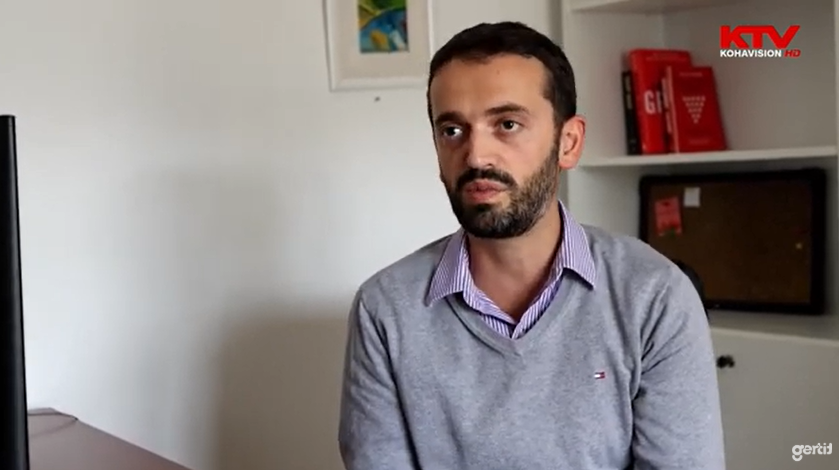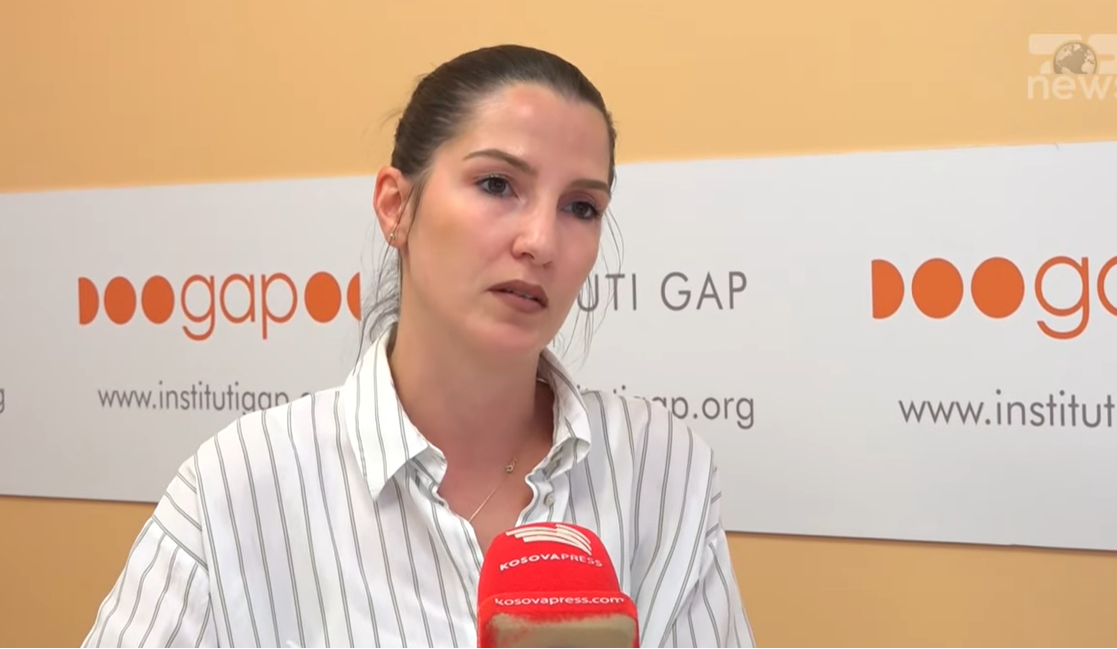GAP Institute publishes 30 reports on municipalities top problems
22/09/2017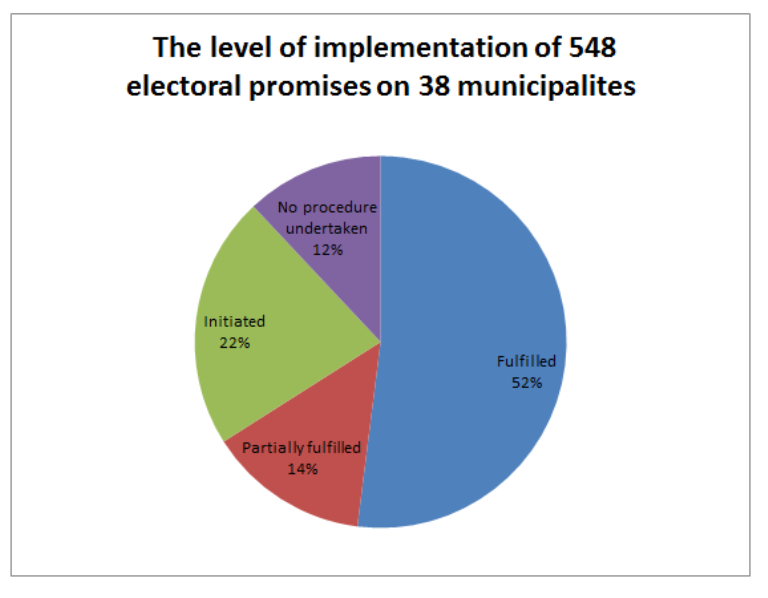
Today, the local election campaign has officially started, which will be held on 22 October, 2017. During the period July and August 2017, GAP Institute has conducted interviews with members of civil society, media representatives, experts and political representatives and has identified five major problems that each municipality faces, the solution of which falls under the competence of municipal governments.
These reports identify main problems and budget trends for several years for each municipality. During the four years of mandate (2013 - 2017), GAP institute has monitored all the promises that were made by mayors of 30 municipalities in Kosovo.
In the last elections, 522 promises were made by 30 mayors. During this period of time (2013-2017), snap local elections were held in Gracanica and Drenas, which increased the total number of promises to 548.
The promises have affected different areas, mainly those on infrastructure and public services, but also on economic development, employment growth, social issues, environmental issues, budgetary aspects, education, agriculture, health, culture, sports, tourism, administration, youth and cultural heritage.
From the total of 548 promises, 283 were fully met, 78 were partially met, while for 121 promises there are only some procedures/steps initiated, and for 66 promises there was no procedure nor any step undertaken.
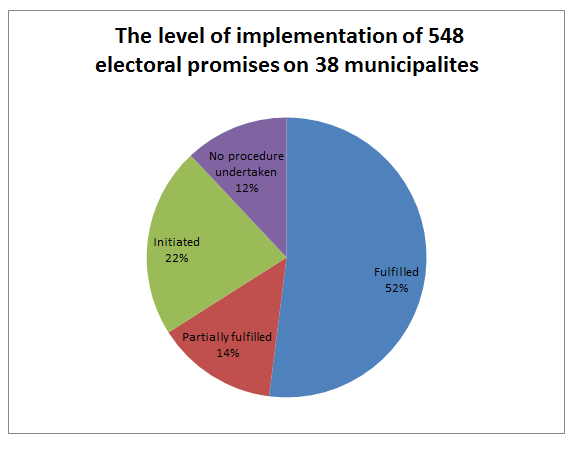
The category where most of the promises are fulfilled is infrastructure: road reconstruction and maintenance, the installation of the water supply network, sewage treatment plants, public lighting, bridge construction, etc. In this category 185 promises were given, 117 promises are fully fulfilled, 25 promises are partially fulfilled, 31 promises have initiated and for 18 promises there was no procedure undertaken. Unfulfilled promises in this category are mainly related to the extension of the sewerage network, sewage treatment plants, road expansions, and bridge reconstruction.
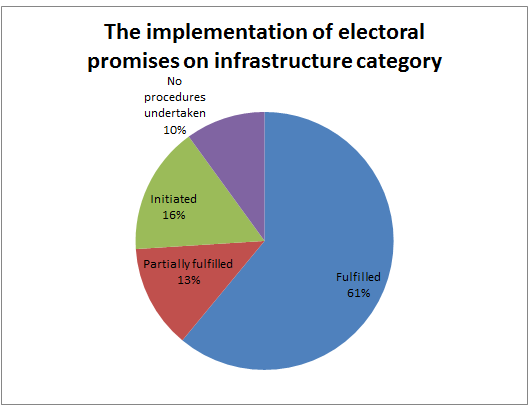
The second category of promises that were mostly fulfilled is agriculture, where most of the promises were given to support farmers with: working machines, milking machines, seeds for planting, offering beehives for bees, providing assistance for opening new farms, building greenhouses, building stands, planting upgrades agriculture, irrigation of lands, farmer to farmer advice as well as assistance in selling products. In this category 96 promises were given, 63 promises are fulfilled, nine promises are partly fulfilled, ten have been started, and for 14 promises there was no procedure undertaken. Unfulfilled promises are mainly on the increase of agricultural plantations and on the trade of agricultural products.
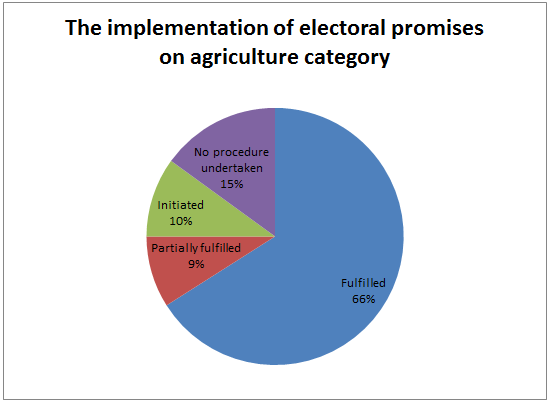
The third category on the level of fulfillment of promises is the category on public services. This area of promises includes, the removal of waste dumps, the designation of roads, the cleaning and regulation of river beds, the installation of waste bins and containers, the creation of parks and greenery, the establishment of emergency staircases in buildings and maintenance of collective buildings. 88 promises were made in this area, out of which 55 were fully fulfilled, 11 promises were partially fulfilled, and six promises were on early stage, whereas for three promises there were no steps undertaken.
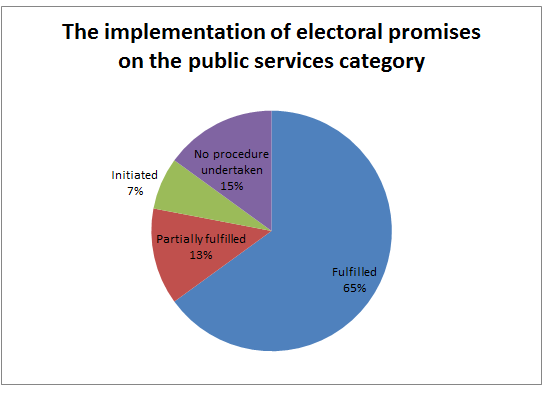
The fourth category of the level of fulfillment of promises is education. Promises for this area were regarding, the construction of school buildings, the construction of school annexes, the removal of the third shift in schools, the award of scholarships, the periodic evaluation of teachers, the increase of the number of cabinets and laboratories, the opening of libraries, sport areas within schools. There are 72 promises made in this area, out of which 19 are fully fulfilled, 31 partially fulfilled, seven promises were on early stage, whereas for 15 promises there were no steps undertaken. The category of unfulfilled promises includes periodic evaluation of teachers, increasing the number of cabinets and laboratories and sports areas.
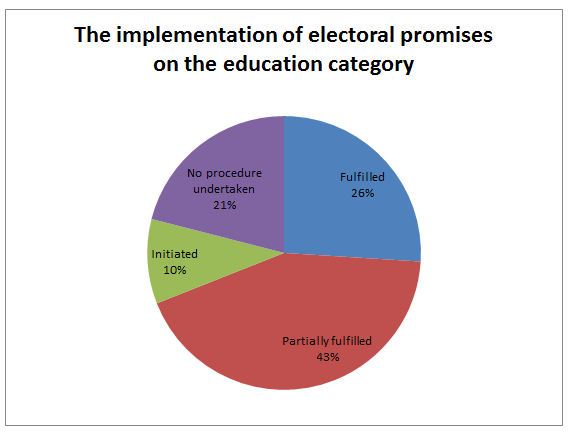
Areas where municipalities have failed to fulfill promises are related to economic development, job creation, attracting investment from the diaspora, opening new enterprises, functionalizing economic zones and industrial parks, developing public and private partnership projects, improvement of health sector, protection of cultural heritage, creation and financing of archaeological research teams, coverage of areas with regulatory plans, drafting of sector strategies, etc.
GAP Institute in the future will monitor the mayor promises given during this election campaign and will report on their realization for the next four years.
To read the reports on the main problems and budget trends in 30 municipalities of Kosovo, click HERE.
For more information on the degree of realization of the promises by the current mayors, click HERE.










